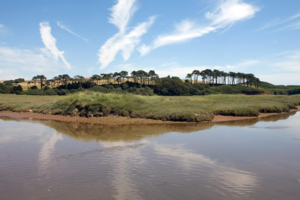Devon project showcases the future of our coasts
Lower Otter Restoration Project (LORP) showcases schemes to adapt to climate change.

The mouth of the River Otter at Budleigh Salterton, East Devon
- LORP project is working in tandem with a similar scheme in France
- Both projects are examples of work being discussed this week at the Coastal Futures conference
Organisations looking at how climate change is affecting our coasts are coming together this week for an online conference, Coastal Futures.
One example of adaptation work that can be done to meet the challenges of rising sea levels is Promoting Adaptation to Changing Coasts (PACCo). An innovative project, funded in part by the ERDF’s Interreg France Channel England fund, PACCo has 2 arms – in England the Lower Otter Restoration Project at Budleigh Salterton, Devon and in France, the Basse Saâne: 2050 project at Quiberville in Normandy.
The €26 million twin projects are both managed realignments – returning the floodplains to how they were 200-plus years ago, before land at both sites was reclaimed for agricultural use – designed to adapt to the changing climate. The embankment built on the Lower Otter and the dykes built at Quiberville are no longer fit for purpose, with both sites having flooded on a number of occasions. Without action now, both sites are at risk of catastrophic failure.
The work, due to complete in March 2023, will result in 100 hectares of mudflats and saltmarshes being created across the 2 sites. These will improve biodiversity, offering new habitats for a variety of wading birds and act as carbon sinks, with saltmarshes sequestering an estimated four tonnes of carbon per hectare each year.
Estuarine and coastal habitats are among our most valuable natural assets but they are under significant threat due to the impacts from climate change.
With the predicted one-metre sea level rise in parts of England by the end of the century, action is needed now to protect the habitat and biodiversity that connects land and sea. Turning this around will require a society-wide effort and water companies, industry, government, regulators, landowners and individuals all have roles to play.
As part of the PACCo project, a “how to” guide will be developed setting out all of the aspects of the 2 schemes, in order for other bodies in coastal regions to assess whether a similar managed realignment scheme might be suitable for their areas. It is thought up to 70 estuarine sites in southern England and northern France may benefit from this kind of scheme.
The Coastal Futures conference is supported by the Environment Agency – the lead partner in the PACCo project. Information on the Coastal Futures conference is available at: http://coastal-futures.net/.